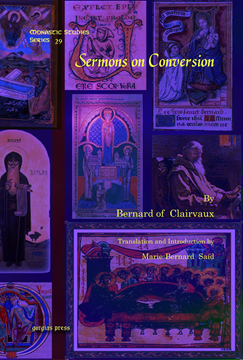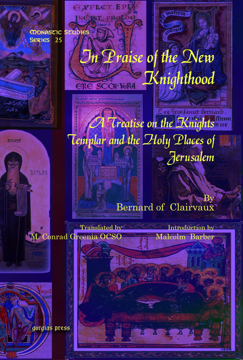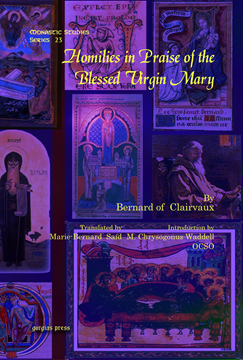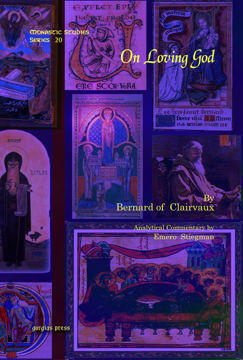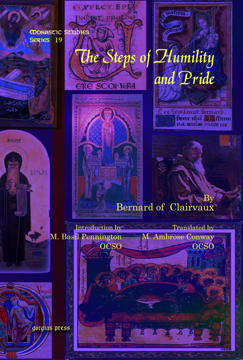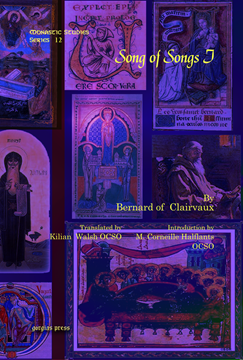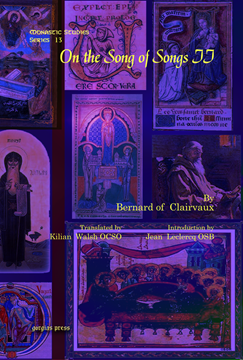Bernard of Clairvaux
Sermons on Conversion
By Bernard of Clairvaux; Translation and Introduction by Marie-Bernard Saïd
Series: Monastic Studies Series 29
ISBN: 978-1-60724-207-9
The burgundian reformer abbot draws a picture of the perfect frontier bishop, and holds him up as a model for bishops everywhere. Conversion is used here not in the modern sense of transferring from one ecclesiastical body to another, but in the patristic and monastic sense of metanoia, turning one's entire being wholly to God.
$178.00 (USD) $106.80 (USD)
In Praise of the New Knighthood
A Treatise on the Knights Templar and the Holy Places of Jerusalem
Series: Monastic Studies Series 25
ISBN: 978-1-60724-203-1
The monk and the knight—the two quintessentially medieval European heroes—were combined in the Knights Templar, men who took the monastic vows and defended the holy places and pilgrims. With characteristic eloquence, Bernard of Clairvaux voices the cleric's view of the knights, warfare, and the conquest of the Holy Land in five chapters on the knight's vocation. Then, in another eight chapters the abbot who never visited the Holy Land provides a spiritual tour of the pilgrimage sites guarded by this 'new kind of knighthood.'
$143.00 (USD) $85.80 (USD)
Homilies in Praise of the Blessed Virgin Mary
By Bernard of Clairvaux; Translated by Marie-Bernard Saïd; Introduction by M. Chrysogonus Waddell OCSO
Series: Monastic Studies Series 23
ISBN: 978-1-60724-201-7
The young abbot meditates on the singular role of the Virgin Mother of Christ 'to satisfy [his] own devotion', and in doing so bequeathes his own love of Mary and of Scripture to his Order and to the Church.
$142.00 (USD) $85.20 (USD)
On Loving God
By Bernard of Clairvaux; Analytical Commentary by Emero Stiegman
Series: Monastic Studies Series 20
ISBN: 978-1-60724-198-0
Perhaps Bernard's most delightful tract, On Loving God posits that everything good in human persons is an expression of God's love and by love the person may participate in the being of the triune God. In a new analytic commentary, Stiegman examines Bernard's language, logic, and theology, demonstrating the vital importance of reading medieval authors on their own terms, without superimposing categories developed by later generations.
$168.00 (USD) $100.80 (USD)
The Steps of Humility and Pride
By Bernard of Clairvaux; Introduction by M. Basil Pennington OCSO; Translated by M. Ambrose Conway OCSO
Series: Monastic Studies Series 19
ISBN: 978-1-60724-197-3
The son of Burgundian nobility, Bernard admitted after years of struggle that humility remained for him the most elusive of the virtues. Yet the uncompromising vehemence of his love for God made him strive for what monastic tradition taught is indispensable to anyone hoping to share God's perfect love.
$114.00 (USD) $68.40 (USD)
The Life and Death of Saint Malachy the Irishman
By Bernard of Clairvaux; Translated and Annotated by Robert T. Meyer
Series: Monastic Studies Series 17
ISBN: 978-1-60724-195-9
This book tells the life of a saint by a saint. Malachy O'Morgair spent his life and considerable energies exhorting, wheedling, badgering, and praying his countrymen back to christian faith and practice. Bernard holds him up in this Life, eulogy, and hymn as a model to bishops.
$129.00 (USD) $77.40 (USD)
Song of Songs I
By Bernard of Clairvaux; Translated by Kilian Walsh OCSO; Introduction by M. Corneille Halflants OCSO
Series: Monastic Studies Series 12
ISBN: 978-1-60724-191-1
A profound mystic, Bernard sought, above all and in all, to be with God and to bring all persons to the experience of God. His Sermons on the Song of Songs are among the most famous and most beautiful examples of medieval scriptural exegesis. In them the modern reader can catch a glimpse of the genius which an entire generation found irresistible.
$130.00 (USD) $78.00 (USD)
On the Song of Songs II
Series: Monastic Studies Series 13
ISBN: 978-1-60724-190-4
A profound mystic, Bernard sought, above all and in all, to be with God and to bring all persons to the experience of God. His Sermons on the Song of Songs are among the most famous and most beautiful examples of medieval scriptural exegesis. In them the modern reader can catch a glimpse of the genius which an entire generation found irresistible.
$152.00 (USD) $91.20 (USD)

